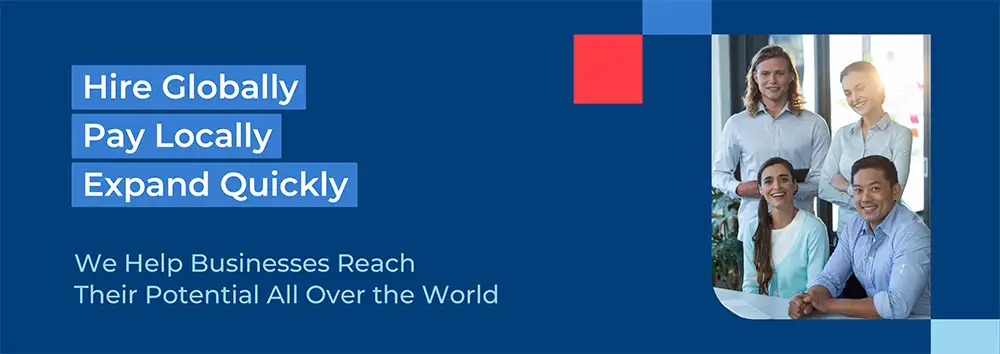Minneapolis, part of the Twin Cities along with Saint Paul, is one of the most vibrant business and cultural hubs in the Midwest.
Known for its economic strength, high quality of life, and skilled workforce, Minneapolis has become a prime destination for companies seeking to expand in the United States.
As home to several Fortune 500 companies, including Target, Best Buy, and U.S. Bancorp, Minneapolis boasts a strong economy that spans healthcare, retail, financial services, technology, and manufacturing.
Its universities, research institutions, and diverse population create a dynamic labor market ideal for companies hiring in 2025.
This guide provides everything employers need to know about hiring in Minneapolis, from compliance and taxation to recruitment strategies and employee benefits.
How to Hire in Minneapolis Easily in 2025
Employers looking to hire in Minneapolis have two main pathways:
- Establishing a U.S. entity in Minnesota, registering with state and federal authorities, and managing HR, payroll, and compliance internally.
- Partnering with an Employer of Record (EOR), which allows companies to hire in Minneapolis without setting up a local entity. The EOR manages payroll, contracts, benefits, and compliance while the employer directs the employee’s day-to-day work.
Key steps for hiring in Minneapolis include:
- Registering for employer tax accounts with both the IRS and the state of Minnesota.
- Drafting clear job descriptions aligned with industry norms.
- Following Minnesota’s state-specific labor standards in addition to federal regulations.
- Offering competitive benefits to attract and retain talent.
- Leveraging Minneapolis’s extensive recruitment networks, including universities, local job boards, and professional associations.
Why Hire in Minneapolis? The Benefits of Hiring in Minneapolis
Strategic Location
Located in the upper Midwest, Minneapolis is strategically positioned as a hub for commerce, distribution, and finance. Its international airport, Minneapolis–Saint Paul International Airport (MSP), provides direct connections to both domestic and international markets. The city’s strong infrastructure makes it a vital base for logistics and business operations.
Highly Educated Workforce
The Twin Cities region benefits from institutions like the University of Minnesota, which consistently ranks among the top research universities in the country. The city produces highly skilled graduates in fields such as engineering, healthcare, business, and information technology, ensuring a steady pipeline of talent.
Diverse and Resilient Economy
Minneapolis is home to a wide range of industries, including financial services, healthcare, retail, technology, food production, and manufacturing. This economic diversity makes the city resilient to downturns and provides companies with opportunities across multiple sectors.
Quality of Life and Talent Attraction
Minneapolis is consistently ranked as one of the best U.S. cities for quality of life, thanks to its parks, cultural institutions, and relatively affordable cost of living compared to coastal hubs. The city’s livability helps attract and retain highly skilled professionals.
Legal Requirements for Hiring Employees in Minneapolis
Employers must comply with both federal labor laws and Minnesota-specific employment regulations when hiring in Minneapolis.
Employment Contracts
Minnesota follows the “at-will” employment principle, which allows either the employer or employee to end the relationship at any time, provided the termination does not violate anti-discrimination or labor laws. Written contracts are not legally required but are commonly used to outline job duties, compensation, and benefits.
Working Hours and Overtime
The standard workweek in Minneapolis is 40 hours. Under the Fair Labor Standards Act (FLSA) and Minnesota law, non-exempt employees must be paid 1.5 times their hourly rate for hours worked beyond 40 per week. Minnesota also has specific rules around meal and rest breaks.
Probation Periods
Probationary periods are not mandated by Minnesota law but are widely used by employers. Most companies in Minneapolis implement a 90-day probation period to evaluate new hires.
Termination of Employment
As an at-will state, Minnesota allows employers to terminate employees without cause, provided the termination does not involve discrimination or retaliation. Employers are advised to document reasons for dismissal to avoid legal disputes. Severance pay is not required by law but may be offered voluntarily or included in company policies.
Taxation and Social Security Contributions in Minneapolis
Employers in Minneapolis must comply with federal tax obligations and Minnesota state requirements.
1. Individual Income Tax (IIT)
Minnesota imposes a progressive state income tax, with rates ranging from 5.35% to 9.85% depending on income brackets. Employees must also pay federal income tax, which ranges from 10% to 37%. Employers are responsible for withholding both state and federal taxes.
2. Employer Contributions to Social Insurance
Employers in Minneapolis contribute to several mandatory programs:
- Social Security: 6.2% of wages (matched by employees).
- Medicare: 1.45% of wages (matched by employees).
- Federal Unemployment Tax (FUTA): 0.6% of the first $7,000 in wages after credits.
- Minnesota State Unemployment Insurance (SUI): Employers must contribute at rates that vary based on experience and industry.
- Paid Family and Medical Leave (PFML): Beginning in 2026, Minnesota will phase in a new program requiring contributions to fund family and medical leave benefits.
3. Contribution Bases
Social Security contributions are capped at the federal wage base (about $168,600 in 2025). Medicare has no cap, though employees earning above $200,000 must pay an additional 0.9% surtax.
Work Permits and Other Requirements for Hiring Foreign Workers in Minneapolis
Minneapolis’s international reputation in healthcare, technology, and finance attracts many foreign workers. Employers hiring non-U.S. citizens must comply with federal immigration rules.
- Visa Sponsorship: Employers commonly sponsor H-1B visas (specialty occupations), L-1 visas (intra-company transfers), and O-1 visas (extraordinary ability). Sponsorship requires proving the role cannot be filled locally.
- Labor Condition Application (LCA): Required for certain visa types to confirm compliance with wage standards and workplace protections.
- E-Verify: Many Minnesota employers use E-Verify to confirm the work eligibility of new hires.
- Medical and Background Checks: Certain visa categories require background verification and health screenings.
Current Trends and Top Recruitment Strategies in Minneapolis
Minneapolis has a highly competitive labor market. Companies should adopt effective recruitment strategies such as:
- University Engagement: Building partnerships with the University of Minnesota and local colleges provides access to graduates in healthcare, business, and engineering.
- Focus on Healthcare and Finance: With major hospitals and financial companies based in Minneapolis, these industries require targeted recruitment campaigns.
- Technology and Innovation: The city’s growing tech sector is driving demand for IT professionals. Employers should highlight innovation and career advancement.
- Diversity and Inclusion: Minneapolis has a diverse workforce, and inclusive hiring practices are increasingly important to attract candidates.
- Hybrid and Remote Work: Many professionals expect flexible work arrangements. Offering hybrid or remote options helps companies stand out.
Hiring Skilled Workers vs. Entry-Level Talent in Minneapolis
Hiring Skilled Workers
Skilled professionals in Minneapolis, particularly in healthcare, technology, and financial services, expect comprehensive benefits, advancement opportunities, and strong company cultures. Employers should highlight leadership opportunities, professional development, and stability.
Hiring Entry-Level Talent
The Twin Cities provide a steady pipeline of entry-level talent thanks to local universities and community colleges. To attract younger workers, employers should provide internships, mentorship, and structured training programs. Clear career progression pathways help build loyalty.
Competitive Benefits in Minneapolis
Beyond compensation, benefits packages are a major factor for attracting and retaining employees in Minneapolis. Common offerings include:
- Health, dental, and vision insurance
- 401(k) retirement plans with employer contributions
- Paid vacation, sick leave, and parental leave
- Tuition reimbursement and professional development support
- Employee wellness programs, including mental health initiatives
- Flexible or hybrid work arrangements
- Subsidized public transportation or parking support
Hiring Solutions for Foreign Companies in Minneapolis
Foreign businesses hiring in Minneapolis can choose among three main models:
Independent Contractors: Flexible and cost-efficient but must be classified correctly to avoid penalties under IRS and Minnesota laws.
Establishing a U.S. Entity: Allows direct control but requires significant investment, incorporation, and compliance with state tax and employment regulations.
Employer of Record (EOR): The most efficient option for international companies. An EOR manages payroll, contracts, compliance, and HR administration, enabling businesses to hire in Minneapolis quickly without creating a local entity.
Trust INS Global to Hire in Minneapolis Today
Minneapolis offers one of the most dynamic and resilient hiring environments in the United States in 2025. With its highly educated workforce, diverse economy, and strong corporate presence, the city is an ideal location for companies across industries such as healthcare, finance, technology, and manufacturing.
At the same time, employers must navigate Minnesota’s labor laws, state tax requirements, and immigration procedures when hiring international talent. That’s where INS Global can help.
Our Employer of Record (EOR) services in Minneapolis make hiring seamless, efficient, and compliant. We handle payroll, benefits, contracts, and HR compliance while you focus on expanding your business and building strong teams.



SHARE